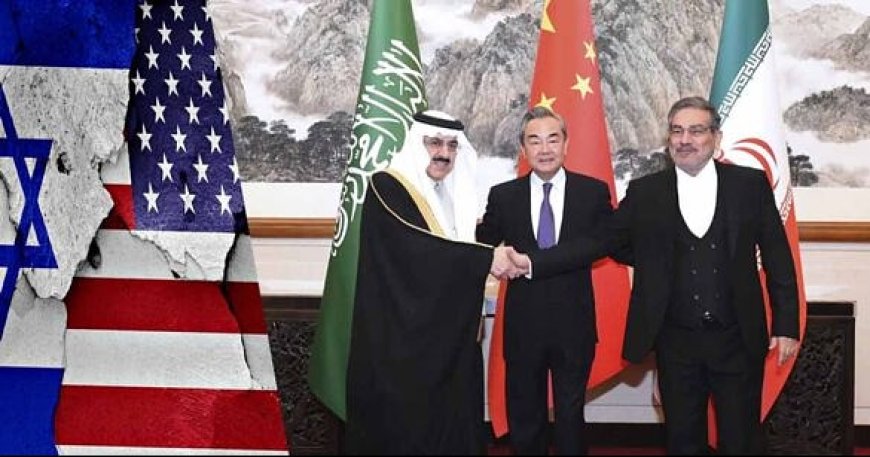Saudi-Iran détente: A devastating setback for Washington and Tel Aviv

By: S. Qurbani
After years of hostile and turbulent relations, China mediated a thaw in ties between Iran and Saudi Arabia, which stunned the world and sparked grave concerns in Israel and the United States.
The shifting dynamics of the global political landscape are reflected in the crucial role China played in assuring the success of the agreement between Iran and Saudi Arabia. Some western observers are becoming concerned about China's growing influence in the Middle East as a result of the declining US hegemony.
The intricate nature of relations in the West Asian region was highlighted by the agreement between Iran and Saudi Arabia on March 10.
According to a report by Fox News, Beijing stands to reap the deal's financial accomplishments, as Iran and Saudi Arabia are two of the region's largest oil-producing nations. On the other hand, mending ties with regional powers would be beneficial to Iran's economy and offer Tehran greater leverage over contentious regional issues like the Israeli-Palestinian conflict.
In 2020, Israel sealed official relations with the United Arab Emirates, Bahrain, and other Arab countries. However, the same Arab nations are now galloping to normalise ties with Iran, throwing Israel's very existence in peril.
The Israeli daily Yediot Aharonot published an in-depth article arguing that Israel's defensive wall had been cracked due to the détente between Iran and Saudi Arabia. Naftali Bennett and Yair Lapid, two former Zionist regime prime ministers who are extremely critical of Israel's beleaguered prime minister, Benjamin Netanyahu, claim that Netanyahu's much-despised judicial overhauls are to blame for the collapse of Israel's internal front and the subsequent resumption of relations between Tehran and Riyadh, which they regard as a catastrophic setback for Israel.
In other words, the agreement between Iran and Saudi Arabia scuttled the American-Israeli strategy to design an alliance led by Tel Aviv against Iran's nuclear program and curb its geopolitical clout. Also, the rapprochement between Tehran and Riyadh dealt a severe blow to Israel's foreign policy, which relies on the absence of any Islamic cooperation. In this regard, the Israeli media recently reported that Israel's animosity towards Iran caused the president of the United Arab Emirates, "Mohammed bin Zayed," to cancel a scheduled visit to occupied Palestine.
Israel will pay an enormous cost for the revival of diplomatic ties between Saudi Arabia and Iran, which it views as having the strongest impact on it amid unprecedented domestic divisions and daily demonstrations against Benjamin Netanyahu's far-right cabinet.
According to Arab commentators, Iran and Saudi Arabia's decision to reestablish diplomatic ties is seen as a progressive political move that closes the door on Israel's plots and aggressions in the region, as it is the only way to create stability in the region, free of conflicts and sectarian skirmishes, and protect the interests of Muslim nations without allowing Israel to gain a foothold.
It is for this reason that some Arab nations, such as the United Arab Emirates, have been relentlessly attempting to enhance relations with Iran and Syria. According to Euronews, negotiations between Riyadh and Damascus have picked up pace after the landmark agreement between Saudi Arabia and Iran. The reestablishment of ties between Riyadh and Damascus is the most significant step in Arab countries' efforts to normalise relations with the administration of President Bashar al-Assad. After the worldwide terrorist campaign against Syria began in 2011, Damascus lost the backing of fellow Arab states. An additional regional insider with ties to Damascus told Reuters that Syria and Saudi Arabia intend to restart their ties after the Eid al-Fitr holidays.
The present scenario has made the US administration agitated, so it is making attempts to change the situation by taking futile measures. In this regard, over the past few days, the United States has been launching attacks against the Axis of Resistance in eastern Syria, drawing fierce reprisal from the Iran-led resistance as rockets and drones pounded US military installations.













































